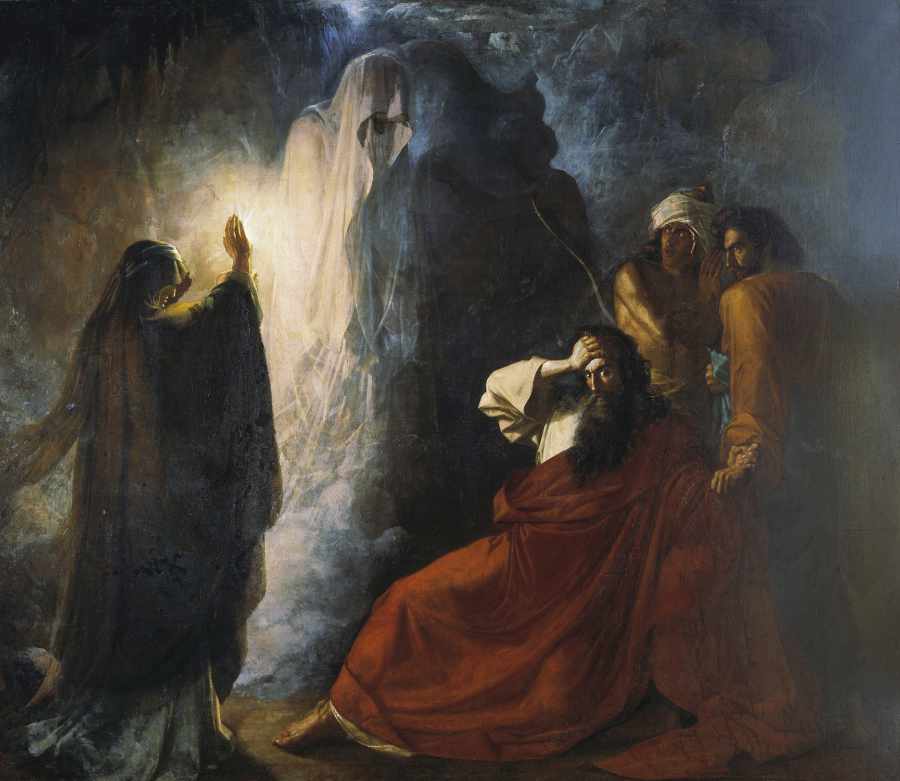The Witch of Endor is a woman who, according to the Hebrew Bible, was consulted by Saul to summon the spirit of the prophet Samuel. Saul wished to receive advice on defeating the Philistines in battle, after prior attempts to consult God through sacred lots and other means had failed. When summoned, however, the spirit of Samuel only delivers a prophecy of doom against Saul. This event occurs in the First Book of Samuel; it is also mentioned in the deuterocanonical Book of Sirach: When the prophet Samuel dies, he is buried in Ramah. Saul, the king of Israel, seeks advice from God in choosing a course of action against the assembled forces of the Philistine army. He receives no answer from dreams, prophets, or the Urim and Thummim. Having previously driven out all necromancers and magicians from Israel, Saul searches for a witch anonymously and is told one is living in the village of Endor. Saul disguises himself and crosses through enemy lines to visit her, asking her to raise Samuel. The woman at first refuses, on account of Saul’s edict against sorcery, but Saul assures her she will not be punished. The woman summons a spirit, and when it appears she works out who Saul is and screams, “Why have you deceived me? You are Saul!” Saul assures her no harm will come to her, and asks what she sees. She says she sees “elohim” rising. Saul asks what “he” looks like, and she describes an old man wrapped in a robe. Saul bows down to the spirit, but is apparently unable to see it himself. The spirit complains of being disturbed, berates Saul for disobeying God, and predicts Saul’s downfall. The living Samuel has already said Saul would have his kingship removed, but this spirit adds that Israel’s army will be defeated, and Saul and his sons will be “with me” tomorrow. Saul collapses in terror; the woman comforts him, and prepares him a meal of a fatted calf to restore his strength. The following day, the Israelite army is defeated as prophesied: Saul is wounded by the Philistines, and commits suicide by falling on his sword. Spiritualists have taken the story as evidence of spirit mediumship in ancient times. The story has been cited in debates between Spiritualist apologists and Christian critics.
| Alias Witch of Endor |
| Real Names/Alt Names Unknown |
| Characteristics Biblical Figures, Literary Characters, Witch, Seer, Iron Age |
| Creators/Key Contributors ○ |
| First Appearance Hebrew Bible (Tanakh) |
| First Publisher ○ |
| Appearance List Literature: Hebrew Bible (Tanakh), The King James Version of the Bible, “The Religion of Ghosts” in Spiritualist at Work vol. 1 #19 (24 April 1875), “Saul” by Lord Byron (1815), “In Endor” by Shaul Tchernichovsky (1893), Rudyard Kipling’s “En-Dor” (1919). Music and opera: Mors Saulis et Jonathae by Charpentier (c. 1682), Saul by George Frideric Handel (1738), Die Könige in Israel by Ferdinand Ries (1837), Le Roi David by Honegger (1921), David et Jonathas by Charpentier (1688), Saul og David by Carl Nielsen (1902), The Witch of Endor by Martha Graham Dance Company (1965). Theatre: Laurence Housman’s Samuel the Kingmaker (1944), Howard Nemerov’s Endor (1961). |
| Sample Read The King James Version of the Bible [PG] |
| Description The Witch of Endor is a woman who, according to the Hebrew Bible, was consulted by Saul to summon the spirit of the prophet Samuel. Saul wished to receive advice on defeating the Philistines in battle, after prior attempts to consult God through sacred lots and other means had failed. When summoned, however, the spirit of Samuel only delivers a prophecy of doom against Saul. This event occurs in the First Book of Samuel; it is also mentioned in the deuterocanonical Book of Sirach: When the prophet Samuel dies, he is buried in Ramah. Saul, the king of Israel, seeks advice from God in choosing a course of action against the assembled forces of the Philistine army. He receives no answer from dreams, prophets, or the Urim and Thummim. Having previously driven out all necromancers and magicians from Israel, Saul searches for a witch anonymously and is told one is living in the village of Endor. Saul disguises himself and crosses through enemy lines to visit her, asking her to raise Samuel. The woman at first refuses, on account of Saul’s edict against sorcery, but Saul assures her she will not be punished. The woman summons a spirit, and when it appears she works out who Saul is and screams, “Why have you deceived me? You are Saul!” Saul assures her no harm will come to her, and asks what she sees. She says she sees “elohim” rising. Saul asks what “he” looks like, and she describes an old man wrapped in a robe. Saul bows down to the spirit, but is apparently unable to see it himself. The spirit complains of being disturbed, berates Saul for disobeying God, and predicts Saul’s downfall. The living Samuel has already said Saul would have his kingship removed, but this spirit adds that Israel’s army will be defeated, and Saul and his sons will be “with me” tomorrow. Saul collapses in terror; the woman comforts him, and prepares him a meal of a fatted calf to restore his strength. The following day, the Israelite army is defeated as prophesied: Saul is wounded by the Philistines, and commits suicide by falling on his sword. Spiritualists have taken the story as evidence of spirit mediumship in ancient times. The story has been cited in debates between Spiritualist apologists and Christian critics. |
| Source Witch of Endor – Wikipedia |

